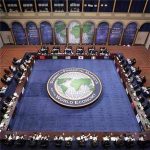Joseph Stiglitz lambasted the White House bailout plan for Wall Street this morning. It’s a brutal rebuttal to the lies and half-truths we were fed all day yesterday by Timmaaay’s minions. Geithner’s plan is a thinly-veiled attempt to funnel even more taxpayer cash directly onto the balance sheets of failed banks.
It is intellectually dishonest and morally bankrupt. Congress voted a certain amount for TARP, and now Geithner is multiplying that sum without going back to Congress by doing all manner of clever-clever things with FDIC guarantees. That might be a good way of raising lots of cash for the banking system, but it’s a very bad way of getting political support.
From the Reuters interview:
The U.S. government plan to rid banks of toxic assets will rob American taxpayers by exposing them to too much risk and is unlikely to work as long as the economy remains weak, Nobel Prize-winning economist Joseph Stiglitz said on Tuesday.
“The Geithner plan is very badly flawed,” Stiglitz told Reuters in an interview during a Credit Suisse Asian Investment Conference in Hong Kong.
U.S. Treasury Secretary Timothy Geithner’s plan to wipe up to US$1 trillion in bad debt off banks’ balance sheets, unveiled on Monday, offered “perverse incentives,” Stiglitz said.
The U.S. government is basically using the taxpayer to guarantee against downside risk on the value of these assets, while giving the upside, or potential profits, to private investors, he said.
“Quite frankly, this amounts to robbery of the American people. I don’t think it’s going to work because I think there’ll be a lot of anger about putting the losses so much on the shoulder of the American taxpayer.”
Even if the plan clears banks of massive toxic debt, worries about the economic outlook mean banks could still be unwilling to make fresh loans, while the prospect of a higher tax burden to pay for various government stimulus plans could further undermine U.S. consumers, he said.
Some Republican lawmakers have also expressed concern over the incentives offered by the government, which could end up providing private investors with more than 90 percent of the funds to buy the troubled assets. But President Barack Obama has said the plan was critical to a U.S. economic recovery,
Stiglitz, a professor at New York’s Columbia University and a former World Bank chief economist, also urged G20 leaders at their London summit next month to commit to providing greater resources to developing countries and said China should be given bigger voting rights in the International Monetary Fund.
“The voices of developing countries, and countries like China that will provide a lot of the money, are not heard.”
China would be hard pushed to reach its targeted 8 percent economic growth this year, but the important thing was that at least the Chinese economy was still growing, he said.
Stiglitz welcomed China’s proposal on Monday for an overhaul of the world monetary system in which Zhou Xiaochuan, governor of the People’s Bank of China, said the IMF’s Special Drawing Right has the potential to become a super-sovereign reserve currency.
Stiglitz has long called for the U.S. dollar to be replaced as the only reserve currency. Basing a reserve system on a single currency whose strength depends on confidence its own economy is not a good basis for a global system, he says.
“We may be at the beginning of a loss of confidence (in the U.S. dollar reserve system),” he said. “I think there is support for some sort of global reserve system.”
sursa: prisonplanet.com












Adauga comentariu